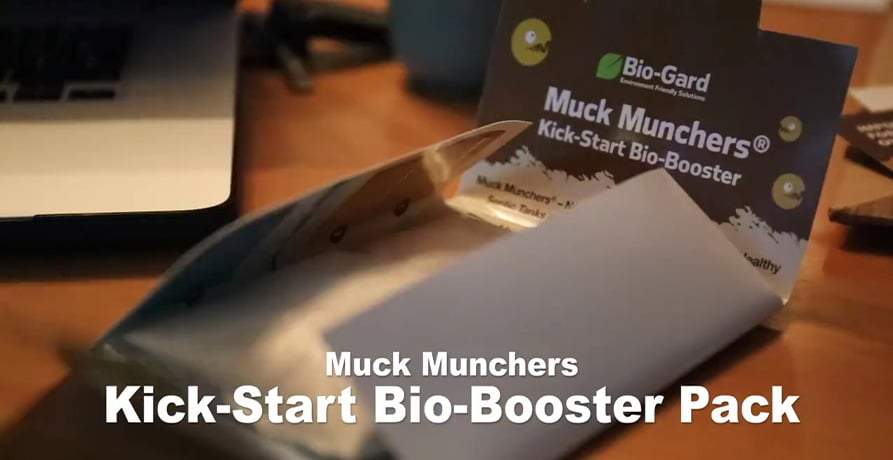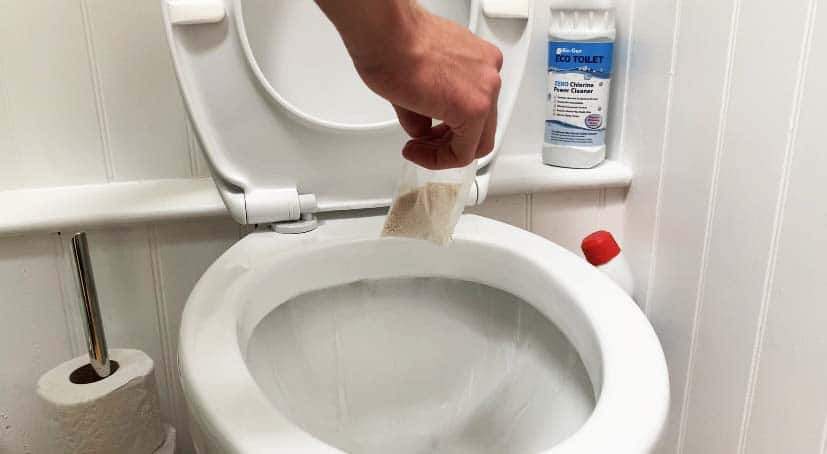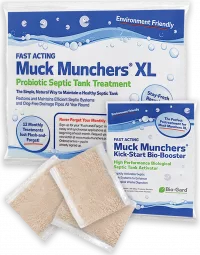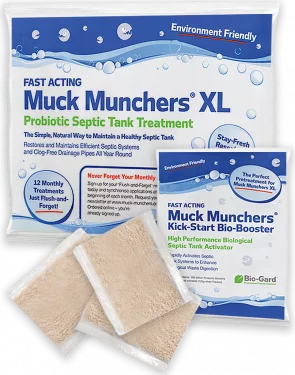What is a Septic Bacteria Starter?
A Septic bacteria starter is the helping hand your tank needs if it is underperforming, but especially following a pump-out.

Septic bacteria starters give the microbe community in your tank a boost to get munching and to ensure that your system is ready to start breaking down waste within a matter of days after adding.
All septic tanks need bacteria to break down organic solids. In this guide, we will take you through everything you need to know, and why using a septic bacteria starter is recommended for your tank and septic system.
Septic Tank Bacteria Starters: All You Need to Know
Whether your septic tank needs reactivating, or you are considering using Muck Munchers for the first time, septic tank bacterial starters are extremely helpful in getting your septic system in prime condition to do their job properly and to their best ability.
Septic tank starters are designed as pre-treatments before introducing new bacteria into your tank. You may find that your septic system is struggling to digest solids and wastewater, or that you have recently had your septic tank pumped out.
1) If you are embarking on using Muck Munchers for the first time Muck Munchers XL comes with 12 treatments (one for each month of the year) PLUS Kick-Start Bio-Booster.
2) If you are planning a pump out then ordering your Kick Start Bio-Booster in advance puts you in a prime position to get your tank ready to start working to its best ability straight away following the pump out. (What to Do After Your Septic Tank Pump Out).
What does a Septic Bacteria Starter Do?
A septic bacterial starter is an initial ‘boost’ of bacteria to your septic tank and system, formulated to help encourage and kick-start enzyme creation.
In many cases, if you have never used Muck Munchers before, you may find that your septic tank’s bacterial population is too low, or even inactive, to start breaking down solids and sludge.
Tanks with very low bacterial levels, and as those that have recently pumped out, will need a concentrated boost of microbes to help encourage immediate breaking down. Microbial digestion with a starter such as Muck Muncher’s Kick-Start Bio-Booster, for example, will introduce hundreds of billions of microbes into your tank. For the everyday septic tank user, that is more than enough bacteria to help set up a septic system on a fresh, healthy start. You will even find that aerobic bacteria introduced with a starter can reduce bad smells and even help to reactivate your drain field. The benefits are likely to be obvious after just a few days of introduction.
When Do You Know When to Use a Septic Tank Starter?
Should you ever find you need to pump out your septic tank, it is important to re-introduce bacteria into your septic system as soon as possible. Regularly topping up bacteria to break down solids in your tank will help to prevent costly and unnecessary pumping in future.
The best way to do this is to start as early as possible. Once your tank is pumped and clear, introduce a septic tank starter into the system and start to build microbe populations. Billions of microbes added to your tank – again, such as through the Kick-Start Bio-Booster – will help to re-awaken your tank’s digestive properties.
It is a good idea to add a septic tank starter to your system if your tank is sludge-free, and if your bacteria population is low. If solids are simply not digesting properly in your tank and system, this is a tell-tale sign that bacteria is neither active nor healthy.
You can use a kick-starter at any time this may be the case, however, you will likely find that you always need to add boosters after pumping out.
Tell-Tale Signs of a Bad Septic System
A septic system that’s failing to produce healthy, digestive, aerobic bacteria is one that will likely be smelling foul inside and outside the house. You will also likely find that water starts to pool outside, or even back up inside your appliances and plumbing.
Common plumbing issues for septic tank households, such as slow-draining sinks and blocked pipes, may also indicate that you have low bacteria populations. Of course, there are several reasons why such plumbing problems can occur. However, if your septic tank has not received bacterial treatment for some time, they can be key indicators that your system needs a little more support.
Of course, it is never a good idea to continue flushing anything into your septic tank that your bacteria is unlikely to break down. Try and keep your flushes to the 3Ps – pee, poo and paper. Chemical cleaners and non-septic tank friendly bleaches, too, can drastically reduce the microbe population.
What Active Ingredients Making a Septic Starter
Septic tank starters such as the Kick-Start Bio-Booster contain billions of bacteria – active ingredients – which eventually create enzymes to help break down natural solids and waste in your septic tank.
Active ingredients such as these microbes work hard in large numbers, and naturally, start munching through waste as soon as they are added to your tank. These microbes are aerobic bacteria, which means they need oxygen to survive and to continue breaking down solids. Anaerobic bacteria are the reverse, and are found lower down in a septic system – oxygen effectively kills these microbes on sight.

How to Use a Septic Bacteria Starter
We’ve developed our septic bacteria starters to be as easy to apply and activate as possible. All you need to do is let a soluble sachet of bacteria starter dissolve in your toilet, before flushing away. Our advice here, of course, is to leave your toilet to fully digest the bacteria for a few hours and to ensure the microbes travel all the way down into the septic tank. You may wish to flush again after this period.
Then, it is simply a case of waiting a few days for the results to start emerging. You can then start adding traditional Muck Munchers to help keep your bacteria levels healthy and high, and to ensure that your waste levels continue to reduce for the months to come. We highly recommend a 12-month service to ensure you avoid any unnecessary pumping out.
How Long Does a Septic Bacteria Starter Take to Work?
While the billions of bacteria in your septic starter will start working to break down your solids right away, it is unlikely you will start to see any changes in the system until a few days after flushing the microbes. The first few hours to days, in fact, it will be very rare you notice any impact.
Therefore, make sure to check your tank after three to four days – and start noticing the incredible breaking down in action. After a few days of treating your septic tank with a bacteria starter, you will likely expect clean flushing, no internal odours, and ‘business as usual’.
How Will I Know That the Septic Bacteria Starter is Taking Effect?
It’s not possible to actually see bacteria eating away at septic tank waste, but you can actually see activity through bubbles appearing at the surface layer of your tank. As more and more bubbles emerge, you can be sure that your tank’s scum layer is breaking down over time. It also means that more liquid, and less solid, is building up in the tank.
However, don’t be worried if you can’t see bubbles emerging in your tank after the period suggested. Sometimes it can take a little longer for action to restart depending on your specific circumstances. Of course, if you are ever worried about bacterial activity in your tank after using Muck Munchers products, do be sure to call our care team for advice and guidance.
Conclusion
Without starter bacteria, it can take a long time for your septic tank to start breaking down and digesting waste again. You will likely find you need a septic tank starter to re-invigorate your microbes after pumping out, or if you find your tank is digesting extremely slowly.
If you are ever in any doubt about the digestion abilities of your tank, Muck Munchers are always here to help. Be sure to take a closer look at our Bio-Booster and long-term treatments – and save yourself time, money and hassle on unnecessary pumping in the long run.










